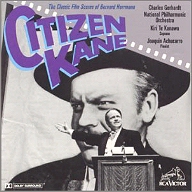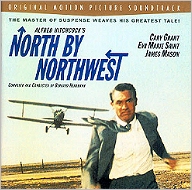 Bernard Herrmann was born on June 29, 1911 in New York City into a typical middle-class Jewish family of Russian origin. In spite of this, however, few traces of Russian or Jewish musical influence found their way into his own music. "Benny" was given piano and violin lessons as a small boy, although he never became even moderately proficient on either instrument. He certainly did not compose at the piano: the most he did was intermittently to check out a harmonic progression. Herrmann was drawn more to experiments in pure timbre and color for which he had to rely on his inner ear. At 13 he read Berlioz's treatise on orchestration and resolved to compose. On graduating from High School he entered New York University to study composition.
Bernard Herrmann was born on June 29, 1911 in New York City into a typical middle-class Jewish family of Russian origin. In spite of this, however, few traces of Russian or Jewish musical influence found their way into his own music. "Benny" was given piano and violin lessons as a small boy, although he never became even moderately proficient on either instrument. He certainly did not compose at the piano: the most he did was intermittently to check out a harmonic progression. Herrmann was drawn more to experiments in pure timbre and color for which he had to rely on his inner ear. At 13 he read Berlioz's treatise on orchestration and resolved to compose. On graduating from High School he entered New York University to study composition.
Herrmann's first "breakthrough" came at the age of 19. He conducted in public at a concert of the League of Composers where, among other things, he directed an octet by George Antheil. Through this performance the two met and became friends. One day the author and playwright J.P. McAvoy came to Antheil and asked him to compose a ballet for his forthcoming Americana review. Antheil at the time was busy writing his opera Helen Retires and had to refuse the commission, but suggested Herrmann in his stead. McAvoy engaged him not only to write the ballet, but to conduct it as well for a twenty-six week period. When John Green joined CBS as conductor he took Herrmann with him as arranger and assistant conductor, and it was here that the latter's involvement with serious dramatic music really began.
In 1934 he was made a CBS staff conductor and started to conduct symphonic programs. Then, in 1940, his career opened out in another direction. At CBS he had met the young Orson Welles who at the time was running an enterprise called "The Mercury Theater," and in 1936 Herrmann became its musical director. In that capacity he was involved in the famous War of the Worlds presentation which terrified the nation. In 1940 when Welles took his company to Hollywood to make Citizen Kane (1941) Herrmann accompanied him to write the score. His score for Citizen Kane earned Herrmann an Oscar nomination. The following year he won the Academy Award for The Devil and Daniel Webster (1941).
 Herrmann collaborated again with Welles on his next RKO assignment, The Magnificent Ambersons (1942). He returned to New York briefly, and the following year he came back to Hollywood to score Jane Eyre (1944). Jane Eyre was a 20th Century Fox film, and for the next fifteen years or so Herrmann worked more consistently for Fox than for any other studio: this was due largely to Alfred Newman, the head of the Music Department, who was quick to appreciate Herrmann's exceptional talent. He next wrote scores for such diverse films as The Ghost and Mrs. Muir (1947), The Day the Earth Stood Still (1951), and Beneath the 12-Mile Reef (1953).
Herrmann collaborated again with Welles on his next RKO assignment, The Magnificent Ambersons (1942). He returned to New York briefly, and the following year he came back to Hollywood to score Jane Eyre (1944). Jane Eyre was a 20th Century Fox film, and for the next fifteen years or so Herrmann worked more consistently for Fox than for any other studio: this was due largely to Alfred Newman, the head of the Music Department, who was quick to appreciate Herrmann's exceptional talent. He next wrote scores for such diverse films as The Ghost and Mrs. Muir (1947), The Day the Earth Stood Still (1951), and Beneath the 12-Mile Reef (1953).
The momentous collaboration with Alfred Hitchcock began in 1955 with the composer's nearest approach to a comedy score, The Trouble with Harry. The following year came the remake of the 1934 The Man Who Knew Too Much (1956). Herrmann refurbished the scoring of the Storm Cloud Cantata somewhat and appears as conductor in the Albert Hall sequence; the remainder of the score is his own original work. The Wrong Man (1956) was based on a real-life story of a New York double-bass player called Manny (Henry Fonda) arrested for crimes he did not commit because of his resemblance to the real criminal. In the sublime scene d'amour in Vertigo (1958) when Kim Novak emerges from the bathroom to meet James Stewart, there is no dialogue whatever, only the camera and the music.
Psycho (1960) is perhaps Herrmann's most spectacular Hitchcock achievement. Since the film was shot in black and white, the composer felt that the strings of the orchestra alone would provide a suitably monochrome aural complement. North by Northwest (1959) demanded a totally different type of score. If North by Northwest is to be classified as a comedy thriller, unusually larger-than-life even by Hitchcockian standards, in musical terms the comedy lies in the elasticity of the dance thythm, the thrills and chills in the harsh brilliance of the orchestral sonority. Following The Birds (1963), which contained no music but in which Herrmann worked as a sound-consultant, his final film for Hitchcock was Marnie in 1964.
By the time Herrmann came to write his last scores, Brian de Palma's Obsession and Martin Scorsese's Taxi Driver--both 1976--he was an ailing man, a fact to which neither score bears any testimony. In Obsession the musical protagonists are a chorus of female voices (wordless) and pipe organ, supported by an orchestra of strings and brass. The scene of Taxi Driver is contemporary New York, a "city of dreadful night," and Herrmann in his unique way creates a poetry of the modern metropolis. The score evolved unpremeditatedly out of the bluesy alto-saxophone melody at once sensuous and acrid, originally written separately as a piece of source music.
Taxi Driver was set in New York, the scene of Herrmann's greatest conducting triumphs and where he laid the foundations of his career. It was recorded in Hollywood where he achieved world renown as a composer, having been written in London which he always regarded as his spiritual home. In fact, as at the end of Citizen Kane, the pieces all fit together; and Taxi Driver is dedicated by Scorsese--in the film's final caption--"in gratitude and admiration to the memory of Bernard Herrmann."
--CHRISTOPHER PALMER, from But during his time with Hitchcock, Herrmann also worked on various other projects, The Seventh Voyage of Sinbad (1958), Journey to the Center of the Earth (1959), Mysterious Island (1961), and Jason and the Argonauts (1963). In 1966 Herrmann began an association with Francois Truffaut, a Hitchcock admirer of long standing. In his second film with Herrmann, The Bride Wore Black (1967), the orchestra dispenses throughout with violins, establishing a pastel tone-quality. His way of allowing the rhythm and texture of a film to determine the character of the music so that the one may enhance and complement the other is nowhere more apparent than here, although from the composer's point of view, at least, Farenheit 451 (1966) was the more successful of the two Truffaut collaborations.
But during his time with Hitchcock, Herrmann also worked on various other projects, The Seventh Voyage of Sinbad (1958), Journey to the Center of the Earth (1959), Mysterious Island (1961), and Jason and the Argonauts (1963). In 1966 Herrmann began an association with Francois Truffaut, a Hitchcock admirer of long standing. In his second film with Herrmann, The Bride Wore Black (1967), the orchestra dispenses throughout with violins, establishing a pastel tone-quality. His way of allowing the rhythm and texture of a film to determine the character of the music so that the one may enhance and complement the other is nowhere more apparent than here, although from the composer's point of view, at least, Farenheit 451 (1966) was the more successful of the two Truffaut collaborations.
The Composer in Hollywood.